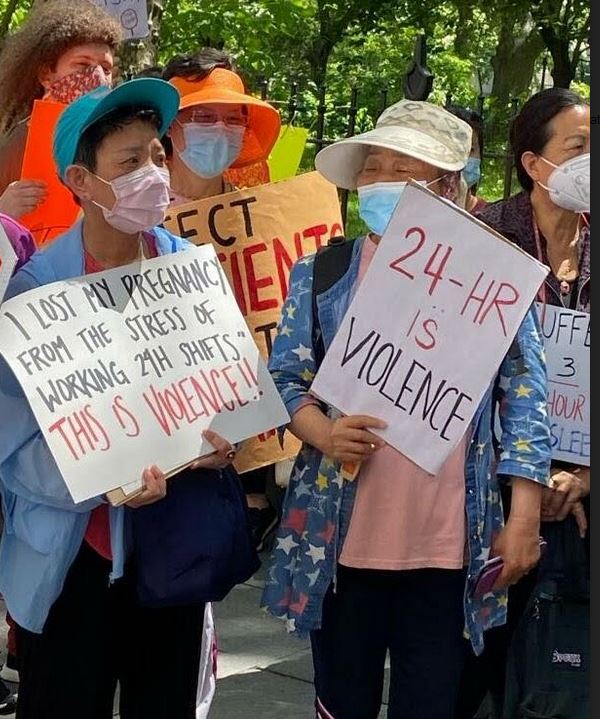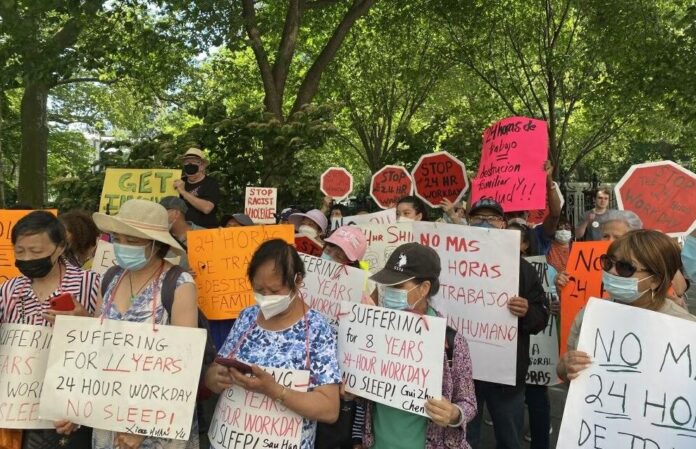By Julia Tong, AsAmNews Contributor
After becoming a home care worker in 2015, Zhu Nu Jun was assigned to care for patients with severe illnesses who were often bedbound. Forced to work full time for multiple days on end, Zhu soon found she was exhausted, unable to sleep, socially isolated, and separated from her family.
On top of that, Zhu is only paid for 13 hours of work by the agency that hired her— despite caring for her patients 24 hours a day.
“We are exhausted, our bodies are injured,” she said in Mandarin.
“The 24-hour workday has been… really harmful for me. There is no time to rest. The patients will get up three times an hour. Our fingers are twisted, our backs hurt, our feet are sore.”
Though the fight against the 24-hour workday has been ongoing since 2015, a new bill proposed by City Councilman Christopher Marte may finally end the 24-hour workday in NYC. The bill, referred to as the “No More 24” Act or Intro 0175-2022, was introduced in April, but has since stalled in the council.
Now, workers from organizations across the city are rallying at New York City Hall on April 12th. They are calling on City Council Speaker Adrienne Adams to immediately bring Intro 0175 to a vote, and formally render the 24-hour workday illegal.
Since first learning about the bill in a newspaper, Zhu has become a vocal supporter for Intro 0175. She hopes that the rally will lead to the bill being passed, alleviating the harmful working conditions she faces every day.
“I hope to see the speaker will come out and Intro 0175 will be passed,” Zhu says. “And I hope to get back my stolen wages, get back homecare worker’s health, the patient’s safety, and return our wages.”
“Regardless of morning or evening, we have to be on top of the health and safety of patients 24 hours a day”
Home care work is physically demanding work that is also highly gendered and racialized. Workers— most of whom are immigrant women of color— live with their patients for days at a time. Those patients are often elderly and bedbound, requiring workers to physically lift them to stand up, as well as constantly monitor them throughout the day and night.
Workers, however, say that the physical consequences of this work are devastating. Many suffer arm, back, leg, and other injuries from lifting and moving immobile patients; brain fog, confusion, and an inability to sleep from a lack of rest; chronic pain; and are often forced to retire early due to these injuries. Zhu says that she was hit by a patient she was caring for, and has since lost the ability to hold a pen in her hand.
Despite this, home care workers are only paid for 13 hours of work a day. Agencies claim that the other 11 hours are time spent eating and sleeping, which do not need to be paid.
According to Zhu, however, this policy does not reflect the reality of being a home care worker.
“We simply don’t get 5 hours of uninterrupted sleep, but of course the home care agency and the government didn’t bother,” says Zhu. “Regardless of morning or evening, we have to be on top of the health and safety of patients 24 hours a day.”
The mental health consequences are also severe. Workers have little time to spend with their own families, and often live alone with their patients for days at a time. Zhu experienced the consequences of this isolation firsthand, as she gradually lost her socialization skills due to her home care job.
“When living with my elderly patient for 24 hours, I forgot how to speak,” Zhu says. “When I went out, I forgot how to talk to people. I only learned how to talk to people again when I came to the [Chinese Staff and Worker’s Association (CWSA)].”

“Saying that it’s completely okay to just not pay Asian woman for the labor that they do— it’s quite absurd”
If passed, Intro-0175 will split those 24-hour shifts into a 12-hour day shift and night shift, as well as limit work to less than 50 hours per week. Supporters say this will benefit home care workers and patients alike.
Detractors, however, claim that the bill will not sufficiently address the underlying causes of the 24-hour workday. One of the bill’s notable opponents is the home care worker’s union, 1199SEIU. As Documented previously reported, a representative for the union said that the bill is too focused on the city level
“They’re trying to make this a city issue when this is a state issue because a lot of the money comes from state funding. So even if it goes through in the city, that’s not actually going to amend the problem,” the representative said, per Documented. “We want every worker to get paid for every hour, we want them to be able to support themselves, but we are not going to find that by passing the bill.”
However, the union failed to support an earlier statewide bill ending the practice that was proposed in 2021. And home care workers have previously fought the union for failing to meet one of their most important demands: Restitution for the 11 hours of previously unpaid work they did each day.
By all estimates, the amount of wage theft from the unpaid 11 hours a day of work is staggering. 554 wage theft claims from home care workers have been submitted to the NY Department of Labor, totalling over $64.5 million— or an average of nearly $116,500 per worker. The Ain’t I a Woman Campaign calculated the amount of back pay owed as around $130,000 per worker, and a lawyer representing 1199SEIU also estimated that, as of 2019, 5 to 6 billion dollars in backpay was owed to home care workers.
In 2022, 1199SEIU negotiated a settlement with home care agencies that provided $30 million in compensation to home care workers. This amount, however, only represents 0.5% of the total owed to workers— leading grassroots organizations such as the Ain’t I a Woman Campaign to describe the settlement as “insulting.”
However, Sarah Ahn, an organizer with the Ain’t I a Woman Campaign, says that the struggles home care workers face goes beyond the union, and even Intro-0195. The 24-hour workday, she observes, is fundamentally rooted in a form of structural anti-Asian racism which is not always visible to the public.
“[The 24-hour workday] just shows not just the physical and mental damage and violence that’s being put on Asian woman but also how the government is almost sanctioning it,” Ahn says. “Because homecare is funded by the government and dictated by the government, saying that it’s completely okay to just not pay Asian woman for the labor that they do— it’s quite absurd.”
Anti-Asian racism, Ahn observes, is usually associated with physical or verbal attacks such as being punched on the street. But unfair labor conditions are a form of racist, gendered violence that can be even more pernicious and damaging.
“If you have state-sanctioned violence and wage theft that is predominantly hurting Asian woman and another immigrant woman of color, then there’s no way that our society can treat any of us with any respect, right?” she adds.
Ultimately, Ahn says, the rally at City Hall— and the entire campaign against the 24-hour workday— is also a fight to fundamentally change the systemic discrimination at the heart of anti-Asian violence. And the public mobilization of female home care workers directly challenges stereotypes of the apolitical and quiet Asian woman.
“By having so many women come forward and shatter the image of the Asian woman as submissive, as obedient, as willing to do what other people aren’t willing to do, by coming out in droves to really point the finger at how racist or sexist this is actually is and this so-called progressive city is— this is really inspiring,” says Ahn.
“From there, we could really change much more than just ending the 24-hour workday.”
AsAmNews is incorporated in the state of California as Asian American Media, Inc, a non-profit with 501c3 status. We are currently funded by our readers and the California Library Commission’s Stop The Hate program under the State Dept of Social Services. See their funded resources for direct, prevention and intervention services here. Find additional content from AsAmNews on Instagram , Twitter, Tiktok and Facebook. Please consider interning, joining our staff, or submitting a story, or making a tax-deductible donation.



I hope they get what they want and deserve. It’s ridiculous to be paid for only 13 hours per day, when you are making yourself available 24/7. If the position pays for only 13 hours, then why are they even allowed to call it a 24-hour job??